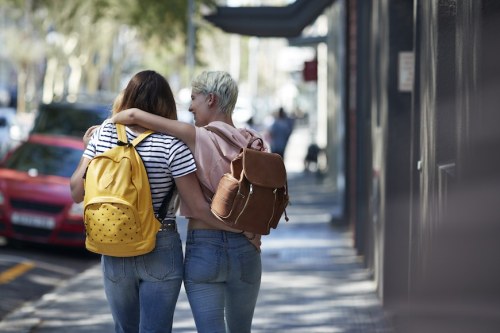Best friends forever are supposed to last, well, forever, and losing one can be a very rough, painful, emotional experience. Sometimes the distress feels more intense than what comes from a romantic breakup. With a BFF breakup, the one person who’s always there to listen to you vent, take you out for a night on the town to cheer you up, or binge-watch movies with you while downing a pint of nice cream is no longer there to ease the pain. It’s definitely not an easy loss to get over.
But, while it’s not easy, do keep in mind that it’s a common experience through which many folks suffer. And, it could be the result of many different issues, says therapist and friendship expert, Miriam Kirmayer. Maybe the friendship was downright toxic and you finally had enough. Maybe there was one big fight that led to the falling out (i.e., your trust was violated) or tons of little things (like a friend being flakey all. the. time.) that signaled to you it was time to go your separate ways.
Our lives change. We change. Then one day, you find that you just don’t have anything in common anymore.
“More often than not, friendships end because of this gradual distancing process that happens,” Kirmayer says. Our lives change. We change. Then one day, you find that you just don’t have anything in common anymore. Or, it might just be the fact that your schedules don’t match up and you no longer have time to invest in the friendship.
How things end, though, obviously has implications on how a person overcomes the situation. If you feel totally betrayed by your BFF, for example, of course there will be strong emotions swirling—and those can make getting over it so much harder. But even if the split came about because you’re both just too busy to hang anymore—and you’d both agree there are no hard feelings—it’s still a difficult thing to process. To help you navigate this tough time, Kirmayer shares six tips for how to deal.
Below, check out the expert-approved ways to get over a friendship breakup.

1. Realize that it’s normal
“Changes in friendships are common,” Kirmayer says. “And knowing that a friendship breakup is an expected, albeit difficult, part of friendships can take the edge off a little.”
2. Up your self-care routine
Being nice to yourself during this time is also very important, Kirmayer says. So really focus on upping your self-care in whatever ways feel good for you, whether it’s hanging out at your local wellness spot or taking a fun workout class.
3. Show yourself some compassion
It’s important to ensure your body is nourished with some good self-care, but it’s also vital to keep your mind positive. “People tend to personalize the breakup,” Kirmayer says. “They feel like it’s their fault and this can often lead to profound sadness and even loneliness.”
To combat this, she suggests watching the way you talk to yourself about the breakup. “Instead of jumping to conclusions and telling yourself you’re a bad friend or that you did something wrong or that you should just get over it, really show yourself compassion,” she says. Know that it always takes two, and you were only one half of the friendship.
4. Reach out to your network
As tempting as it is to spend your time moping in bed while catching up on your favorite shows, one of the worst things that you can do is isolate yourself. “That will only exacerbate things,” Kirmayer says. “Reach out to people you trust to help you either process the difficult feelings or thoughts that come up or just to serve as a helpful distraction and reminder of the relationships you do have.”
That said, there is one caveat: Don’t use this time to gossip about your ex-BFF to anyone with ears. “All that will do is increase the feelings of anxiety or sadness that you have,” she says. “And, if you have mutual friends, that puts them in a very difficult position.”
5. Adopt a growth mind-set
Although losing a best friend sucks, there is a silver lining: personal growth. “Using the experience of a friendship breakup to grow can be very powerful and transformative,” Kirmayer says.” Obviously, you don’t want to dwell on things or beat yourself up if you did something wrong. But, taking some time to reflect on the experience and what you learned in a non-critical way will make it easier to cope and it will help you strengthen your existing and future friendships in a major way.
6. Get back out there
Just like with romantic uncoupling, after a period of mourning the loss of the relationship, you have to get back out there. That said, making friends as an adult is not easy. It comes along with its own set of challenges. Like, where the heck are you supposed to meet the new Gayle to your Oprah? And then when you do meet them, how do you jump the hoops of getting close, bridging the difference between “random person you met at your spin class” to “in each other’s weddings”? Should there be a BFF application process involved or something?
The Tinder of friendship is one option, but the easiest place to start is with your existing network. “Let your friends know that you are wanting to meet new people,” Kirmayer says. “People are very happy to set us up on friend dates.”
Another option? Find a hobby or activity you love—like art class, yoga, or volunteering. Not only do structured social settings make it easier to ask someone out for a friendly Sunday brunch or invite them over for gluten-free pizza night, but Kirmayer says it also ensures you and your future bestie already have a common interest. Read: No awkward friend first dates.
The bottom line: Don’t be afraid to put yourself out there. What’s the worst that could happen? Even if it’s a total flop and you don’t make a new friend, doing something you enjoy still falls under the self-care category.
To show your friends you love them, gas them up—here’s how. Also, check out tips for keeping your long-distance friendship strong.
Sign Up for Our Daily Newsletter
Get all the latest in wellness, trends, food, fitness, beauty, and more delivered right to your inbox.
Got it, you've been added to our email list.











